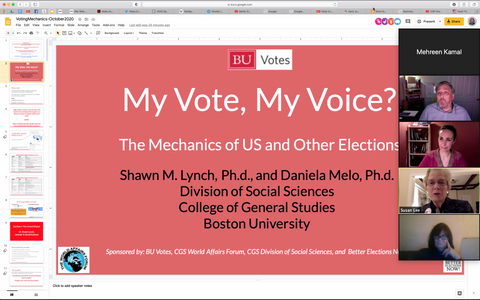CGS Lecturers Discuss Elections in the U.S. and Abroad
As early voting ramped up across the U.S. during a historic election season, the CGS Division of Social Sciences came together in collaboration with BU Votes, CGS World Affairs Forum, and Better Elections Now to examine voting mechanics in the U.S. versus Europe and urge young voters to make their voices heard by voting.
The lecture titled, “My Vote, My Voice? The Mechanics of US and Other Elections,” was presented by CGS social science lecturers Shawn Lynch and Daniela Melo on Oct. 21 as part of a series of events hosted by BU Votes, a campus-wide initiative to increase student voter engagement that was founded by CGS faculty members.

In the first section of the lecture, Lynch addressed the dysfunctions in U.S. elections and proposed how they can be fixed. He explained how some of these problems are blatantly obvious, yet continue to persist due to a lack of reform by those in power.
“No politician will reform the system that put them in power. Change must come from the citizens,” Lynch said.
He went on to highlight seven dysfunctions within the U.S. electoral system: Election Day not being a national holiday, an imbalance in the U.S. Senate that causes small states and rural voters to be overrepresented, gerrymandering, lack of term limits, the Citizens’ United Supreme court decision that was a blow to campaign financing laws, the Electoral College system, and minority rule.
He demonstrated how these “can all be overcome with high voter turnout and in one constitutional amendment” by proposing his own sample amendment at the end of his section. The amendment includes making Election Day a holiday, proportional representation in the Senate, outlawing gerrymandering, limiting the House, Senate, and Presidential terms, banning private financing of campaigns, and proportional voting, as solutions to these problems.
Melo expanded upon Lynch’s criticisms and proposals for the U.S. voting system by comparing it with that of France. She called attention to major components of the French case that the U.S. could take inspiration from.
In France, Election Day is on a Sunday, which allows complete availability for a person to vote. Citizens are also automatically registered to vote when they turn 18, and do not have to go through the hassle of rechecking their voter registration as U.S. citizens do.
Melo attributed the high voter engagement and turnout in France to this ease of voting.
“Voters feel heard and that their voice counts more,” she noted.
In contrast, in the U.S., voters continue to face challenges, especially due to voter suppression laws that diminish the voices of minorities and young voters.
“No electoral system is perfect, but some of them allow citizens to feel more represented than others,” Melo said, citing France as an example.
“Unfortunately, we live in a society where people are rewarded for disengagement,” Lynch said. He added that power is now in the hands of the young people to change this lack of civic engagement and to call for a better future.
“If we can get Millennials and Zoomers to stand up for themselves, we can step back. And they can build what we failed to build,” Lynch said.
Melo concluded with a message for students and faculty. “What we want is for all of us to be voting, to be engaged, and to be mobilizing for the change we want to see out there.”
— By Mehreen Kamal